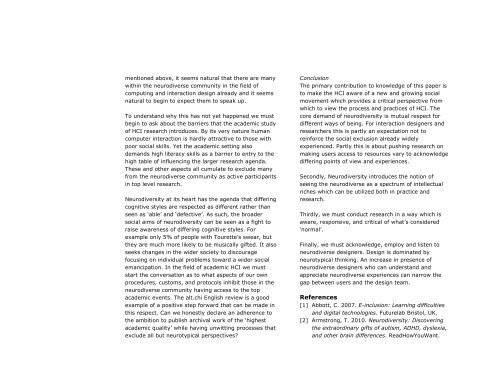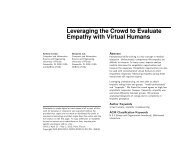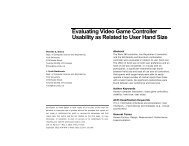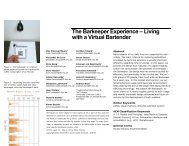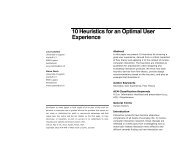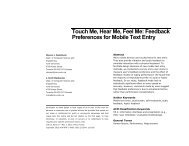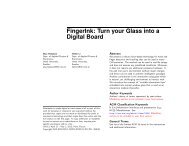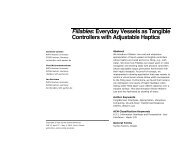Neurodiversity & HCI - alt.chi 2013
Neurodiversity & HCI - alt.chi 2013
Neurodiversity & HCI - alt.chi 2013
You also want an ePaper? Increase the reach of your titles
YUMPU automatically turns print PDFs into web optimized ePapers that Google loves.
mentioned above, it seems natural that there are many<br />
within the neurodiverse community in the field of<br />
computing and interaction design already and it seems<br />
natural to begin to expect them to speak up.<br />
To understand why this has not yet happened we must<br />
begin to ask about the barriers that the academic study<br />
of <strong>HCI</strong> research introduces. By its very nature human<br />
computer interaction is hardly attractive to those with<br />
poor social skills. Yet the academic setting also<br />
demands high literacy skills as a barrier to entry to the<br />
high table of influencing the larger research agenda.<br />
These and other aspects all cumulate to exclude many<br />
from the neurodiverse community as active participants<br />
in top level research.<br />
<strong>Neurodiversity</strong> at its heart has the agenda that differing<br />
cognitive styles are respected as different rather than<br />
seen as ‘able’ and ‘defective’. As such, the broader<br />
social aims of neurodiversity can be seen as a fight to<br />
raise awareness of differing cognitive styles. For<br />
example only 5% of people with Tourette’s swear, but<br />
they are much more likely to be musically gifted. It also<br />
seeks changes in the wider society to discourage<br />
focusing on individual problems toward a wider social<br />
emancipation. In the field of academic <strong>HCI</strong> we must<br />
start the conversation as to what aspects of our own<br />
procedures, customs, and protocols inhibit those in the<br />
neurodiverse community having access to the top<br />
academic events. The <strong>alt</strong>.<strong>chi</strong> English review is a good<br />
example of a positive step forward that can be made in<br />
this respect. Can we honestly declare an adherence to<br />
the ambition to publish ar<strong>chi</strong>val work of the ‘highest<br />
academic quality’ while having unwitting processes that<br />
exclude all but neurotypical perspectives?<br />
Conclusion<br />
The primary contribution to knowledge of this paper is<br />
to make the <strong>HCI</strong> aware of a new and growing social<br />
movement which provides a critical perspective from<br />
which to view the process and practices of <strong>HCI</strong>. The<br />
core demand of neurodiversity is mutual respect for<br />
different ways of being. For interaction designers and<br />
researchers this is partly an expectation not to<br />
reinforce the social exclusion already widely<br />
experienced. Partly this is about pushing research on<br />
making users access to resources vary to acknowledge<br />
differing points of view and experiences.<br />
Secondly, <strong>Neurodiversity</strong> introduces the notion of<br />
seeing the neurodiverse as a spectrum of intellectual<br />
riches which can be utilized both in practice and<br />
research.<br />
Thirdly, we must conduct research in a way which is<br />
aware, responsive, and critical of what’s considered<br />
‘normal’.<br />
Finally, we must acknowledge, employ and listen to<br />
neurodiverse designers. Design is dominated by<br />
neurotypical thinking. An increase in presence of<br />
neurodiverse designers who can understand and<br />
appreciate neurodiverse experiences can narrow the<br />
gap between users and the design team.<br />
References<br />
[1] Abbott, C. 2007. E-inclusion: Learning difficulties<br />
and digital technologies. Futurelab Bristol, UK.<br />
[2] Armstrong, T. 2010. <strong>Neurodiversity</strong>: Discovering<br />
the extraordinary gifts of autism, ADHD, dyslexia,<br />
and other brain differences. ReadHowYouWant.


